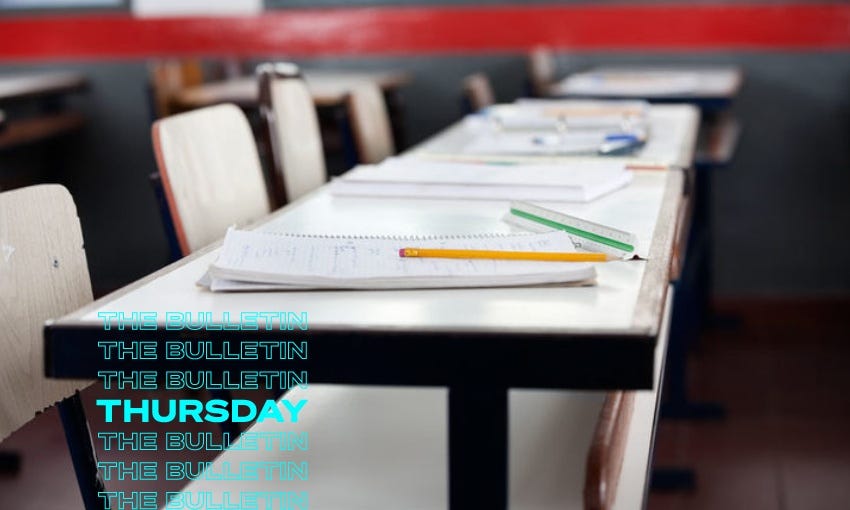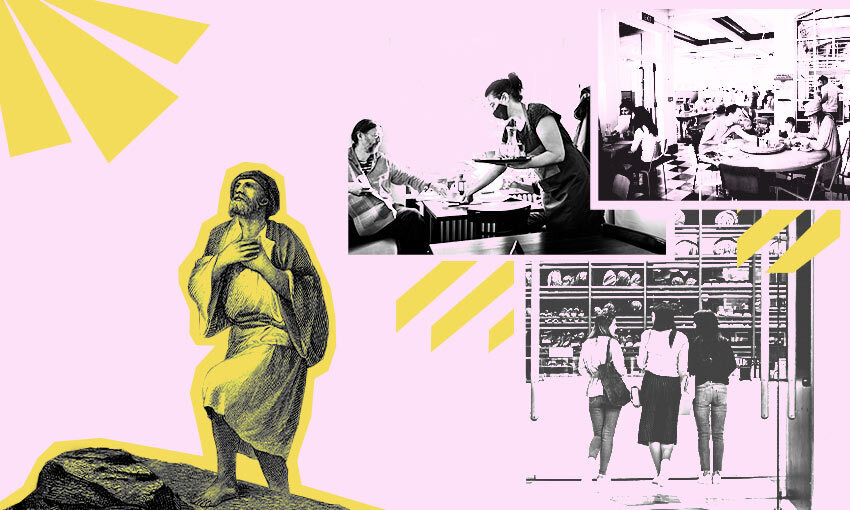The plan to reopen Auckland's schools
All students can return to class next week, but it’ll be part-time for most of them until after the Christmas break
Mōrena and welcome to The Bulletin for Thursday, November 11, by Justin Giovannetti. Presented in partnership with Z Energy.
In today’s edition: Health system overwhelmed by self-isolation; Cop26 summit aims for 2C of warming; Black Caps headed to Twenty20 final; but first, schools are reopening in Auckland and Waikato.
After three months of lockdown, Auckland’s students are headed to class. (RNZ/123 RF)
Get those lunch boxes packed, school is headed back in level three. All students in Auckland and Waikato can return to classes next week, but most primary and intermediate schools will only open part-time in a bid to reduce the ongoing risk of Covid-19 transmission. As One News reports, years 9 and 10 will return full-time from next Wednesday, joining years 11 through 13 who have been in school since last month. The situation is more complicated for years one through eight. While they can also resume classes from November 17, each school and kura is being asked to come up with their own plan for part-time learning until the end of the year. That might be alternating days or half weeks, depending on the school. The Spinoff has written a guide for parents.
The benefits of reopening outweigh the risk of Covid spreading. After nearly three months of disrupted education, Auckland’s high vaccination rates means the calculus has shifted in favour of opening schools up, education minister Chris Hipkins said yesterday, while also appearing in his role as Covid-19 response minister. RNZ spoke to students excited to head back to class after months of trying to learn through a computer. Students are more likely to be infected in out-of-school activities than in the classroom, according to Hipkins. The journal Science has concluded that reopening schools hasn’t contributed to any further community spread of the virus overseas.
There will still be measures in place to control Covid. While younger students aren’t eligible for the Pfizer vaccine, measures are being put in place to control the virus. Mask wearing will be required from year four and up, there will be a focus on ventilation in classrooms and limits on how many students can be in schools at any time. “As vaccination rates increase, including the requirement for teachers to have at least one Covid-19 vaccination from Monday, the risk to children and students is lowered,” said Hipkins. The Conversation has an explainer on how to get the most out of your kid’s mask.
What about next year? Once the summer holiday is over, the government faces a longer-term challenge getting all students back into classrooms permanently. The education minister repeated yesterday that the government’s plan to improve ventilation is to leave windows open year-round. Experts have generally rolled their eyes at that suggestion. Jin Russell, an Auckland paediatrician, has said the government needs a plan for the winter:
“It will be harder to ventilate classrooms or take activities outside and seasonal respiratory viruses surge. Planning should include strategies for an efficient and equitable paediatric vaccine rollout including at schools, improved ventilation in school, the provision of portable air purifiers with HEPA filters for those classrooms which are hard to ventilate or high-risk, and trialling the use of rapid antigen testing for schools such as in Victoria”.
If you like what you’re reading, we need your support. The Spinoff is doing our utmost to keep you updated on Covid-19 related news. Every dollar our members contribute directly funds our editorial team and is devoted to ensuring we do more. Click here to learn how you can support the team today.
Public health wasn’t ready to handle more than 120 daily community cases: Health minister. Andrew Little admitted to Newshub that people are waiting up to two days to hear from health workers after testing positive for Covid-19 because the system can’t cope. Cases are supposed to be contacted within hours. Little said the system was ready for “100 to 120 cases a day”, not the 200 we’re now seeing. The minister hosted an event on October 14, with health staff, to assure New Zealanders that the health system was ready for up to 760 cases a day. The prime minister and Covid-19 minister have also insisted in the weeks since that the system was ready. GPs told RNZ they are stepping in to help manage patients self-isolating at home, but this is temporary and a role they weren’t asked to do.
The AstraZeneca vaccine will be available for some New Zealanders later this month. Unlike the Pfizer vaccine, which remains the default option, access will be tightly controlled and only a few hundred people will qualify for the AstraZeneca dose, Stuff reports.
The Covid numbers: There are 81 cases in hospital and 11 in ICU/HDU (the first time during the delta outbreak this number has crossed into double digits). There are now 2,938 active cases in New Zealand. 131 new community cases were reported in Auckland yesterday, 14 in Waikato and 2 in Northland. 22,178 people were vaccinated on Tuesday.
The Spinoff’s Covid data tracker has the latest figures.
Cop26 draft agreement calls for warming limit of 2C. Recognising a large gap between what countries have promised and where emissions need to go, the draft asks the world’s economies for new short-term targets to cut emissions by 2030, according to The Guardian. There’s also a call to end coal and fuel subsidies. The final wording still needs to be negotiated, but climate activists call it too weak, as the draft only asks for pledges and doesn’t aim countries at the more ambitious target of limiting warming to 1.5C.
NZ’s greenhouse gas emissions rise quickly with surge in coal use. The country’s emissions of climate warming gases increased by 4.8% during the June quarter, the Dominion Post reports. After a dip during the first Covid-19 lockdown, New Zealand’s carbon dioxide emissions have bounced back to near record levels. The burning of coal is the main culprit, with emissions from utilities up 16% in only three months.
Weta Digital’s tech unit sold for NZ $2.28 billion. Unity Technologies, an American video game software developer, has purchased the tools and engineering talent of the Wellington studio. According to Businessdesk, Weta Digital and its visual effects business will remain in the capital under Sir Peter Jackson. The engineers behind the tools that helped create Hollywood effects will also remain here, but will now report to San Francisco.
This week is Apec Leaders' Week, the final part of New Zealand's year as host. As part of Leaders' Week, the first ever virtual Apec CEO Summit will be broadcast from Auckland’s Aotea Centre. The Spinoff spoke to some of the local participants about their vision for the future. Read the story here—created in partnership with Mfat.
Wellington’s most famous cat is leaving for Auckland. You’d think giving the key to the city and a certificate of puns would buy loyalty from the fickle feline, but Mittens is hitting the road. The Dominion Post reports that the shameless flâneur, who was a candidate for New Zealander of the year, will head north during the holiday break. Be kind to him, Aucklanders.
Got some feedback about The Bulletin, or anything in the news?
Get in touch with me at thebulletin@thespinoff.co.nz
Right now on The Spinoff: Anna Rawhiti-Connell writes about the return of shopping in Auckland, with all its therapy and anxieties. Josie Adams gives van life a try and finds it to be quite unglamorous. Dylan Reeve reports for IRL that online fraudsters have found a gold mine in vaccine resistance. Chris Schulz looks at Discovery's big plans to deliver more content to Aotearoa. Tara Ward reviews the latest offerings from the Great Kiwi Bake Off, where bread becomes art.
The Black Caps beat England, headed to Twenty20 final. As Stuff reports, the team surged late in the game with powerful batting to stun the English side. The team will now face either Pakistan or Australia in the final. As my cricket-mad colleagues tell me, the match represents a stunning achievement for the Black Caps across the three formats. They were losing finalists (by the narrowest of margins) in the ODI world cup, winners of the World Test Championship and now finalists in the T20 world cup.
That's it for The Bulletin. If you want to support the work we do at The Spinoff, please check out our membership programme.







